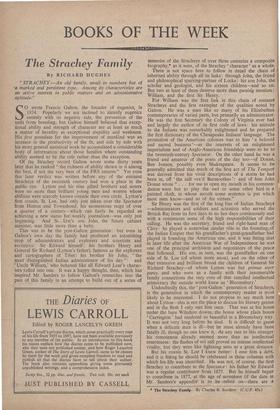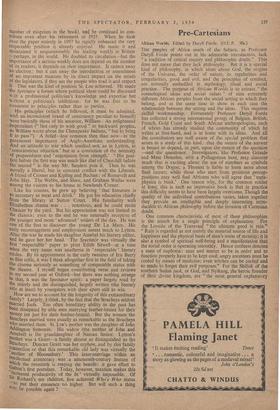BOOKS OF THE WEEK
The Strachey Family
By RICHARD HUGHES "STRACHEY.—An old family, small in numbers but of a marked and persistent type. Among its characteristics are an active interest in public matters and an administrative aptitude."
SO wrote Francis Galton, the founder of eugenics, in 1874. Popularly we are inclined to identify eugenics entirely with its negative side, the prevention of the unfit from breeding; but Galton himself believed that excep- tional ability and strength of character are at least as much a matter of heredity as exceptional stupidity and weakness. His first postulate for the improvement of mankind was an increase in the productivity of the fit, and side by side with his more general statistical work he accumulated a considerable body of information about those families where outstanding ability seemed to be the rule rather than the exception.
Of the Strachey record Galton wrote some thirty years later that he ranked " the richness of ability shown in it among the best, if not the very best of the FRS returns?' Yet even this later verdict was written before any of the eminent Stracheys of the twentieth century had won a place in the public eye. Lytton and his nine gifted brothers and sisters were no more than brilliant young men and women whose abilities were scarcely known outside their own circle. Lytton's first cousin, St. Loe, had only just taken over the Spectator from Hutton and Townshend; his momentous reign of over a quarter of a century—which can fairly be regarded as achieving a new status for weekly journalism—was only just beginning. And St. Loe's son John, the future cabinet minister, was little more than a baby.
This was to be the post-Galton generation : but even in Galton's own day the family had produced an astonishing crop of administrators and explorers and scientists and eccentrics: Sir Edward himself : his brothers Henry and General Sir Richard (Lytton's father), famous as the explorers and cartographers of Tibet: his brother Sir John, " the most distinguished Indian administrator of his day ": and ' Uncle William,' who behaved like all Edward Lear's charac- ters rolled into one. It was a happy thought, then, which has inspired Mr. Sanders to follow Galton's researches into the past of this family in an attempt to build out of a series of memoirs of the Stracheys of over three centuries a composite biography,* as it were, of the Strachey character' as a whole. There is not space here to follow in detail the chain of inherited ability through all its links: through John, the friend and philosophical sparring-partner of Locke: his son John, the scholar and geologist, and his sixteen children—and so on. But two at least of them deserve more than passhig mention: William, and the first Sir Henry.
For William was the first link in this chain of eminent Stracheys and the first exemplar of the qualities noted by Galton. He was a man like so many of his Elizabethan contemporaries of varied parts, but primarily an administrator. He was the first Secretary the Colony of Virginia ever had and largely the author of its first code of laws: his attitude to the Indians was remarkably enlightened and he prepared the first dictionary of the Chesapeake Indians' language. The promotion of the American colonies was to him ` a beloved and sacred business '—as the interests of an enlightened imperialism and of Anglo-American friendship were .to be to the twentieth-century Spectator. On the other hand he was a friend and amateur of the poets of the day too--of Donne, Ben Jonson, possibly even Shakespeare. It seems to be generally admitted that much of the first act of The Tempest was derived from his vivid descriptions of a storm he had been in, off ` the still vex'd Bermoothes': and of him John Donne wrote " . . . for me to open my mouth in his commen- dation were but to play the owl or some other bird in a painted cloth, in whose mouth some sentence is put which most men know—and so of his virtues."
Sir Henry was the first of the long line of Indian Stracheys —administrators and soldiers and scientists who served the British Raj from its first days to its last days continuously and with a continuous sense of the high responsibilities of their calling. He was the secretary, friend and right-hand man of Clive: he played a somewhat similar role in the founding of the Indian Empire that his grandfather's great-grandfather had played in founding the American one, and it was fitting that in later life after the American War of Independence he was one of the principal architects and negotiators of the peace that followed. His son, in turn, was the grandfather on one side of St. Loe (of whom more anon), and on the other of that extensive and brilliant brood the children of General Sir Richard Strachey—of whom Lytton -was but primes inter pares, and who were as a family with their innumerable family connections the very core of that ramified intellectual aristocracy the outside world knew as ' Bloomsbury.'
Undoubtedly this, the ' post-Galton ' generation of Stracheys, is the generation in which the contemporary reader is most likely to be interested. I do not propose to say much here about Lytton—this is not the place to discuss his literary genius and in the flesh I only met him once. That was at his home under the bare Wiltshire downs, the house whose plain bones Carrington ' had rendered so beautiful in a Bloomsbury way. It was not very long before he died. It is difficult to guess when a delicate man is ill—but he must already have been fatally ill, though no one knew it. At any rate to this stranger his remoteness already seemed more than an intellectual remoteness : the flashes of wit still proved an intense intellectual vitality, but they were like lightning seen at a great distance. But his cousin St. Loe I knew better: I owe him a debt, and it is fitting he should be celebrated in these columns with which hisslife was identified. He was not, of course, the first Strachey to contribute to the Spectator: his father Sir Edward was a regular contributor from 1875. But he himself began to contribute in 1877, at the age of seventeen (if the date in Mr. Sanders's appendix- is to be-relied on—there are a
• The Strachey Family. By Charles R. Sanders. (C.U.P. 45s.)
number of misprints in the book), and he continued to con- tribute even after his retirement in 1925. When he took over the paper entirely in 1897 he rapidly enhanced the very respectable position it already enjoyed. He made it and maintained it unquestionably the leading weekly in Britain --perhaps, in the world. He doubled its circulation—hut the importance of a serious weekly does not depend on the number of its readers, it depends on their importance. It cannot sway an election : but it can sway the introduction or amendment of an important measure by its direct impact on the minds of the legislators, if they are the people who read it and respect it. That was the kind of position St. Lee achieved. He made the Spectator a forum where political ideas could be discussed w:th a professional politician's knowledge and expertise but w.thout a politician's inhibitions: for he was free to be consistent to principles rather than to parties.
His principles (which he followed, it must he admitted, with an inconsistent brand of consistency peculiar to himself) Were basically those of his ancestor, William. An enlightened imperialism (" Not only to wish. good " to backward peoples, Ias William wrote about the Chesapeake Indians, " but to bring . it to pass "). A belief—less common then than now--in the paramount importance of Anglo-American understanding. • And an attitude to war which resulted not, as in Lytton. in .. ' conscientious objection' but. in a conviction of the necessity ' of preparedness and ' negotiation from strength.' " His posi- tion before the first war was much like that of Churchill before the 'second " is the way Mr. Sanders puts it. Thus, he' was morally a liberal, but in constant conflict with the Liberals. A friend of Cromer and Kipling and Buchan : of Roosevelt and John Hay. The Webbs, and Shaw, and Graham Wallas were among the visitors to his house at Newlands Corner.



































 Previous page
Previous page